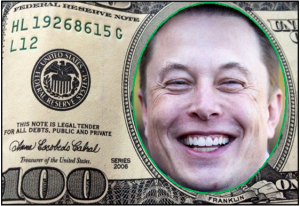Electric cars are kind of like the Internet. Both had tremendous possibilities – especially to free people from the shackles that restrained them for decades.
In the case of the Internet, the shackles were access to – and the ability to widely distribute – information without restriction by a secular priesthood of gatekeepers (i.e., the three major news networks and the handful of major media conglomerates). Online, anyone could publish – and read – just about anything.
It was no less (and arguably more) liberating than the invention of the Gutenberg press in the 15th century – which unchained the printed word from the clutches of the actual priesthood.
But the Internet’s brief flowering of openness is palpably closing. People’s liberty to publish – and read – whatever they like is under threat by the new priesthood – social media conglomerates and a handful of related/interlocking tech companies – who have the ability to suppress (not technically censor) whatever they deem unorthodox, via “de-listing” and “de-monetizing.”
People are still nominally free to publish whatever they like – at least for now. But if what they publish is considered contumacious or otherwise objectionable, their ability to make a living publishing can be (and is being) throttled – making it increasingly very challenging to risk publishing anything that might be construed as “objectionable.”
It probably won’t be long before those who read “objectionable” material find themselves throttled in a similar (and perhaps literal) manner, via social credit/shaming.
The Internet is hideously morphing into something very much the opposite of the Gutenberg Press. It is becoming not only a way to restrict divergent opinion but also a sinister mechanism for imposing uniformity of opinion. One dare not post, YouTube or otherwise put online anything heterodox, else risk financial and career ruination.
Electric cars are traveling the same road.
They could have been so freeing. A simpler, less expensive alternative to the internal combustion-powered car. Electric motors have fewer moving parts; an EV doesn’t have a transmission at all (direct drive). No oil changes or tune-ups needed, ever.
And you could fill up at home.
There is no technical reason preventing the manufacturer of a sub-$10,000 electric car that would serve most admirably as affordable basic transportation for millions of people.
But then government got involved – and made electric cars complicated and expensive toys for the virtue-signaling affluent.
It did this by – on the one hand – subsidizing the manufacture of EVs that emphasized performance and luxury rather than simplicity and economy. Teslas – to cite the most obvious and egregious example – are all big, heavy cars marketed explicitly as high-performance rather than economy cars. Whatever they “save” by not using gasoline is irrelevant as far as pocketbook considerations are concerned.
And if pocketbook considerations aren’t a factor, then EVs become an indulgence rather than an alternative.
Other EV manufacturers have attempted to “compete” with Tesla in this contrived “market – which is heavily dependent on government subsidies precisely because these EVs are not economical and so aren’t an alternative to internal combustion-powered cars – except in the way that a Porsche 911 is an “alternative” to a Toyota Corolla.
But the greater tragedy – which is a function of the fact that the EVs being made exclusively by the crony capitalist cartels, who are the only ones who can make EVs, because of government’s interposition between buyers and sellers – is that EVs are being used to limit our freedom.
And not merely our mobility.
Their exorbitant cost is one way they do this. Debt is a form of slavery and very few people can afford to just buy a $40,000 electric luxury-sport car. Most will have to finance the purchase – and over a longer period of time, to make the monthly payment manageable. Being in hock for more – and longer – takes away from one’s freedom to act, such as to leave a job that has become oppressive or downsize and move to another area.
Another way is more overt – and sinister.
EVs (Teslas for certain and others very likely) are designed, specifically, to tether their owners to the corporate-government Hive Mind. To be “connected” – and so amenable to being controlled. This includes the potential, at least, to restrict when (as well as how) the vehicle can be used (e.g., congestion pricing/no-drive days) and the certainty of monitoring where and when and how far it goes.
EVs will thus add more links to the chains which bind us, just as the Internet is turning into a kind of electronic Mr. Hyde who started out as the gentle, benevolent Dr. Jekyll.
It brings to mind one of the saddest phrases in the English language:
What might have been.
. . .
Got a question about cars – or anything else? Click on the “ask Eric” link and send ’em in!
If you like what you’ve found here please consider supporting EPautos.
We depend on you to keep the wheels turning!
Our donate button is here.
If you prefer not to use PayPal, our mailing address is:
EPautos
721 Hummingbird Lane SE
Copper Hill, VA 24079
PS: Get an EPautos magnet (pictured below) in return for a $20 or more one-time donation or a $5 or more monthly recurring donation. (Please be sure to tell us you want a sticker – and also, provide an address, so we know where to mail the thing!)
My latest eBook is also available for your favorite price – free! Click here. 











Oh look. Excessive recharge time problem solved……. LOL.
https://www.bloomberg.com/news/articles/2018-12-13/bmw-porsche-boast-three-minute-charging-jolt-for-electric-cars?srnd=premium
60 mile range in 3 minutes. Only requires 450kW charger. More LOL.
Now someone should check my math here but, 450kW= 220V @ 2050A. Two thousand AMPS!
Cold,
I especially like the part where it only works on two or three cars.
Are they calling it Mrs. O’Leary’s cow charger?
To be fair it is evolving tech so incompatibilities will be common until a standard develops.
I’m no electrical engineer but I don’t see how they are going to pump 450kW down a reasonable size/weight cable.
Anyone know what cable would be required?
4/0 might not burn through.
Just a guess.
I have to be honest: I hate EVs for emotional as well as practical reasons, simply because of how antiseptic they are with no sound and no gears. That does color my perception of them by quite a bit, so even in a perfectly libertarian society, I would probably hate them anyway if I saw them starting to develop to the point where they could challenge ICE dominance of “mainstream” market segments. It’s the same thing I try to tell people elsewhere… you keep saying it’s alright for cars to be boring because most buyers aren’t car enthusiasts, but we can’t keep running on 60s-00s used cars forever.
Hi Chuck,
I don’t hate them – assuming they’re not subsidized/mandated. I’m just not interested in them, personally. For the same reason I am not much interested in escalators.
RIP VW
Volkswagen says last generation of combustion engines to be launched in 2026
https://www.nbcnews.com/business/autos/volkswagen-says-last-generation-combustion-engines-be-launched-2026-n943991
Oh you simpleton, don’t you know that is what the market wants? Millions of people cannot wait to drive electric vehicles and save the environment!
/s
I would love to have a practical, reliable, cheap electric car, and I’m a car guy. Something like a mid 2000’s car, with no fancy tech, other than an electric drivetrain – simple and reliable, and cheaper than what’s available today. I’m paranoid, I grew up under communism and have seen how far this stuff can go, and the reason that I’d like to have one electric car is that it’s relatively easy to get electricity. You can generate it from lots of different kinds of generators, from solar panels, pull it from the grid, it’s much more versatile than gasoline. I see gasoline rationing coming, and I want to be able to get around.
What I don’t want is an overpriced four wheeled cell-phone that requires a connection to its manufacturer to work at all.
Artificial scarcity of all forms of energy, including electricity, is the end-goal. Once EVs make up a certain percentage of vehicles on the road, the media and thought-leaders will start talking about how strained the grid is. How the solution is higher taxes, to incentivize “reasonable” usage, and scheduled usage hours or allotments. Those in commie block apartments will pay a reduced “shared-usage” rate, while those in single family homes will pay higher rates, since thier inefficient homes use more electricity. No one needs that much land, that much space, that much privacy. What are they hiding in that garage? An internal combustion engine vehicle? They’ll give us all cancer! Driving an IC car will have the stigma of smoking, if we’re lucky.
Opposite,
“I grew up under communism and have seen how far this stuff can go”
Me too.
I grew up in Detroit, where did you live?
The NHTSA has in a way perpetuated the debt load of new vehicles as well as CAFE, sort of like a positive feed back loop, for the bank/usury industry. ALWAYS needing more expensive technology, ALWAYS needing more expensive parts, ALWAYS needing higher sticker prices And now EVs are doing the same. I know you don’t live in a HOA housing development but for most urban/suburban homeowners their home valuation through the appraisal district WILL NEVER GO DOWN. This is by design because anything less would signal falling prices and deflation, both of which are anathema to the banking industry’s ledger and to the nomenklatura’s taxing revenue. (do you remember 2008’s mass unemployment effect on the outlook of social security? or a fall in birth rates effect? think about it). However this parade of mandates and legislation have driven up prices to un-affordable levels even for debt loaded joe sixpack and family. Hence the new need for ride sharing, MaaS, and so on. The symptoms are being perpetually treated and never the cause. Most cognizant boy scouts could build you an electric vehicle for motoring to the grocery store for under $900 but UNCLE’s cash-flow-henchmen would never allow it on the road or ever allow anything affordable to be sold under private transaction because it runs around their perpetual scam.
Note that the only deduction that was never limited was mortgage interest. Now there’s a limit; you cannot deduct i terest on over 750k of mortgage. Every other deduction was limited, including employee expenses, state and local taxes, and medical.
Oh, wait: investment interest was also deductible.
It seems like they want you to borrow money and pay interest
The powers that be don’t want us to have access to decentralized energy. They’re against anything that gives us more freedom and independence.
And joining forces with the Professional Money Launderers, that is the gist of all of this.
One the other hand, I see people toodle-ing around my neighborhood in golf carts.
I’m nearly certain they got these under some form of tax break for an EV.
And why not? the application is perfect. Go from home to the park. To and From the shopping centers that border the area. You can get there through the neighborhood.
If there was something to lament, other than the fact that they’ve ruined the application for a daily driver where you have to commute in a metroplex like mine, is the elbowing out the turbo diesels, which are by far a better deal.
I’ve owned electric golf carts for nearly 25 years. I would say they are far more enjoyable to own than any modern car. Because they’re so simple, they’re extremely easy to repair and maintain. No electronics. My Yamaha even has glass headlights.
*Fewer electronics*